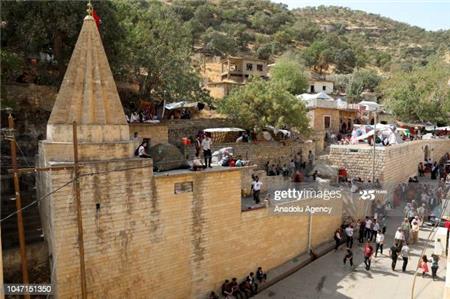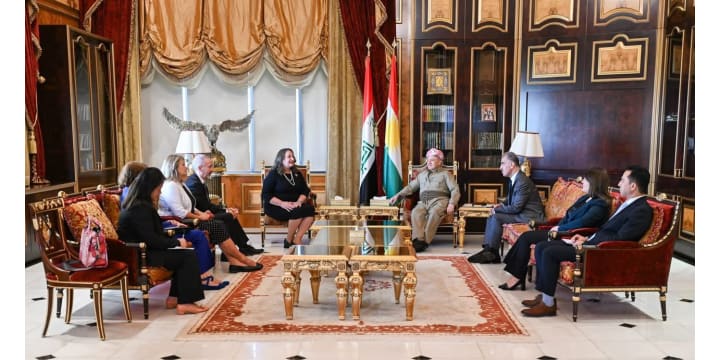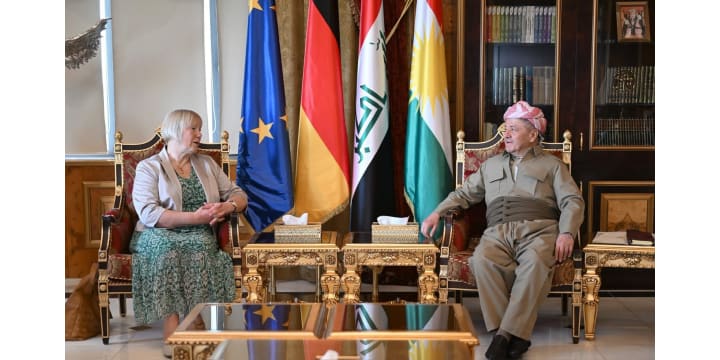
The religious and social ceremonies of Yazidis, continued...
In the previous article, we touched on the most important New Year's ceremonies which start on the first Wednesday of the Eastern Calendar of April of each year, and then the Ezi’s fasting ceremonies, which falls on the first Friday of the Eastern Calandar of December.
Belinda Feast:
Belinda festival falls on the Third Friday of the Eastern Calendar of December (the Eastern Calendar precedes the Gregorian Calendar by thirteen days) and is considered one of the ancient festivals of the Yazidis due to of decrees, symbols and connotations it carries related to nature and the sun. The transition towards the regressive movement of the planet.
Among the most important parts of its ceremonies is where the Yazidis light the fire on Thursday evening, the fire is called ‘GORKA GAI’ which means ‘Bull Flame’ in front of the houses and places of presence, and this is done by lighting a fire, children and family members jump over it three times, indicating the burning of their sins and the start of a new page of life. In the old days they passed the oxen and animals used in plowing over the light fires as an indication to the end of the planting and plowing, and women throw raisins or dates and sweets to celebrate and cheer the holiday. Part of the ashes are taken to sprinkle it on agricultural lands to increase the goodness and blessing, and women make a special bread called ‘SAOK’ and distribute it to the neighbors as a sign of love. ‘Khulira’ is made, which is a large bread where a raisin is placed inside, cooked and distributed among the family members. The head of the family performs the ceremonies, at the beginning the Khulira is placed under a clean piece of cloth and is cut into pieces for all the family members, a piece is distributed to the all the individuals and the person who receives the piece with the raisin in it from his share is to be honored before the head of the family and the events of the next year will be his share, and then the celebration of the occasion begins.
The women visit the shrines of the dead to remember and provide food to the needy. On the day of Eid, congratulations are offered on the occasion and relatives and loved ones visit, and children wear beautiful clothes and rejoice the feast ceremonies.
Feast of Khildlias or Khidir-lias:
The rituals and ceremonies of this feast suggest the authenticity of the occasion and have preserved the characteristics of the rituals and practices of the very ancient history. Their traditions and events go up to the first days of the emergence of a religious figure known as ‘Khidir’ whose emergence coincided with another figure called ‘Ilyas’ and they both have their spiritual and faithful status. According to the Yazidi belief, they fulfill the wishes of THE people On these blessed days, especially for those who are about to marry of the young men and women. There is a connection between the feast of Khidir-Lias, which falls on the first Thursday of the Eastern Calandar of February and Valentine's Day, which falls on the Fourteenth of February as the dates of the two occasions converged since the Eastern Calendar is thirteen days later than the Gregorian.
The most prominent ceremony of this holiday is related to nature, where the Yazidis, especially those who are named after Khidir or Ilyas and some clerics fast for three consecutive days.
The majority of families make a type of food called ‘Pekhom’ which means ‘eat-with’ and it consists of seven types of grains that are grounded together after frying them and then mixed with honey or molasses to obtain natural (sweetness) and it is considered one of the oldest types of sweets that humanity has made. It is served on the first day of the feast and also at the first day of Eid. The farmers sprinkle the sweets on the plantations in order to be blessed, and there are other rituals associated with this holiday, such as preparing a special food for breakfast on the first day called ‘Jarkhous’, which is made of crushed and cooked wheat.
On the days of fasting and Eid, the slaughter of all kinds of animal sacrifices and hunting are forbidden so they let the process of mating and fertilization season start , and this is unlike all the other Yazidi occasions.
It is the occasion of the end of the agricultural season, They still circulate the old saying of Khadir-lias and Sal-Khalas, which means the oncoming of Khidir-lias occasion and the end of the preparation for the new agricultural season.
Shamo Qasim
Head of the Cultural Department at Lalish Center

